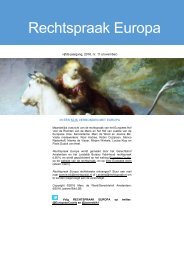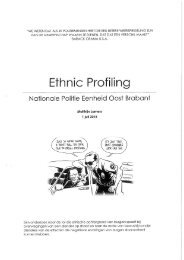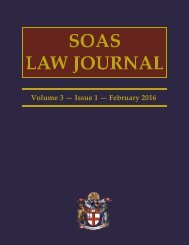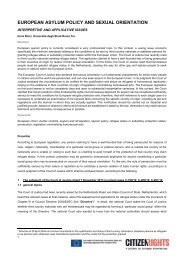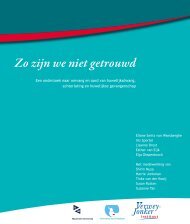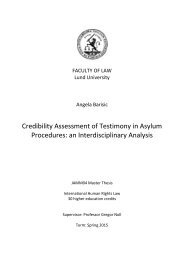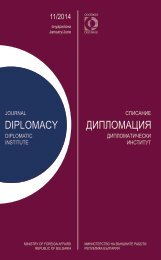AEMI
AEMI-2016-web
AEMI-2016-web
Create successful ePaper yourself
Turn your PDF publications into a flip-book with our unique Google optimized e-Paper software.
SOLANGE MASLOWSKI<br />
sion of the fathers of Europe. Likewise,<br />
the questioning on the Schengen agreements<br />
and their non-respect by Member<br />
States, as well as the lack of mutual solidarity<br />
between the Member States in the<br />
refugee crisis, constitute considerable<br />
breaches into the construction of the<br />
European Union. Member States of the<br />
EU seem to seek prosperity and security<br />
in a very individualistic way, forgetting<br />
the values on which the European<br />
Union 37 is based and their obligation of<br />
solidarity 38 . Times of hardship are excellent<br />
opportunities for solidarity, trust in<br />
one another, and respect of fundamental<br />
rights, common vision and confidence<br />
in a nicer future.<br />
Notes<br />
1<br />
2 This article has been supported by the Czech<br />
Science Foundation – GAČR through its project<br />
N. 15-23606S Selective Issues Deriving from the<br />
Transposition and Implementation of Directive<br />
2004/38/EC.<br />
3 Freedom of movement of workers and of self-employed<br />
persons today is regulated by Article 45<br />
TFEU and Article 56 TFEU, which were already<br />
inscribed in the founding EEC Treaty as part of<br />
the four freedoms (freedom of movement of persons,<br />
of services, of capital and of goods).<br />
4 These rights include the right to move and reside<br />
freely within the territory of the Member States,<br />
the right to vote and to stand as a candidate in<br />
elections to the European Parliament and in municipal<br />
elections in the host Member State, the<br />
right to diplomatic protection in the territory of<br />
a third country, the right to petition the European<br />
Parliament and the right to apply to the Ombudsman,<br />
the right to write to any Community<br />
institution or body in one of the languages of the<br />
Member States and to receive a response in the<br />
same language and the right to access European<br />
Parliament, Council and Commission documents.<br />
5 Article 21 TFEU: Every citizen of the Union shall<br />
have the right to move and reside freely within the<br />
territory of the Member States, subject to the limitations<br />
and conditions laid down in the Treaties<br />
171<br />
and by the measures adopted to give them effect.<br />
6 Every citizen of the Union has the right to move and<br />
reside freely within the territory of the Member States.<br />
Freedom of movement and residence may be<br />
granted, in accordance with the Treaty establishing<br />
the European Community, to nationals of third<br />
countries legally resident in the territory of a<br />
Member State.<br />
7 Directive 2004/38/EC of the European Parliament<br />
and of the Council of 29 April 2004 on<br />
the right of citizens of the Union and their family<br />
members to move and reside freely within<br />
the territory of the Member States.<br />
8 See, for example, Council Directive 93/96/EEC<br />
of 29 October 1993 on the right of residence<br />
for students, Council Directive 90/365/EEC of<br />
28 June 1990 on the right of residence for employees<br />
and self-employed persons who have ceased<br />
their occupational activity, Council Directive<br />
90/364/EEC of 28 June 1990 on the right of residence.<br />
9 Directive 2004/38/EC differentiates between<br />
first-time job seekers who move to another Member<br />
state to seek a job and job seekers who retain<br />
the status of workers after involuntary unemployment<br />
(Article 7-3).<br />
10 According to Article 7 of Directive 2004/38/<br />
EC, job-seekers who are former workers who have<br />
been involuntary unemployed after the first twelve<br />
months retain the status of workers for no less<br />
than six months. After this period of six months,<br />
they might lose their status of workers and fall into<br />
the category of economically inactive Union citizens.<br />
11 See Silvia Gastaldi, Citoyenneté de l’Union et<br />
libre circulation: du critère économique au statut<br />
unique, L.G.D.J.,Paris, 2013.<br />
12 Both grounds are not used in practise by Member<br />
States willing to expell economically inactive<br />
Union citizens. Moreover, the ground of public<br />
health is very special and totally independent of<br />
the economic status of the mobile Union citizen.<br />
It can be used only during the first admission of<br />
the Union citizen or during the first three months<br />
of her or his stay. The ground of threat to public<br />
security is the most serious ground requiring<br />
exceptional circumtances that can hardly be used<br />
against an economically inactive mobile Union<br />
citizen not committing criminal offences under<br />
Article 83-1 TFEU.<br />
13 Regrettably, reports from the European Roma<br />
Rights Centre from 2015 state that more than<br />
11,000 Roma migrants were forcefully evicted<br />
in France in 2015. That shows that no lesson has<br />
been learnt from the collective expulsions of Ro-



